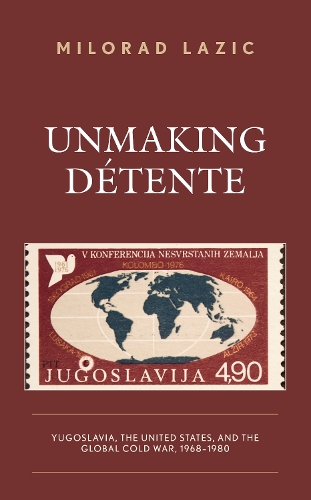
Unmaking Dtente: Yugoslavia, the United States, and the Global Cold War, 19681980
(Hardback)
Publishing Details
Unmaking Dtente: Yugoslavia, the United States, and the Global Cold War, 19681980
By (Author) Milorad Lazic
Bloomsbury Publishing PLC
Lexington Books
29th June 2022
United States
Classifications
Professional and Scholarly
Non Fiction
History of other geographical groupings and regions or specific cultures / socie
Political science and theory
949.7023
Physical Properties
Hardback
304
Width 162mm, Height 225mm, Spine 28mm
635g
Description
This book examines the global history of the Cold War in the 1970s through the perspective of Yugoslavia's activism in the Global South and its relations with the superpowers. The author shows that Yugoslavias anxiety over a new Yalta required a disruptive role toward dtente, which it saw as the superpowers attempt to divide the spheres of influence. Yugoslavias global activism in the 1970s reflected not only its desire to undermine alleged superpowers agreements but also its desire to promote the Yugoslav revolutionary model as a distinctive form of political, social, and economic organization. The author traces the complex interactions between Yugoslavia and the world but also investigates the limitations of Yugoslavia's global activism. Drawing on a novel and wide source base from the archives in the former Yugoslavia, the United States, and Great Britain, the book shows the web of opportunities, problems, and challenges that dtente and the Cold War in the 1970s offered to and imposed on a small state in the Balkans.
Reviews
Socialist Yugoslavia consistently punched above its weight and played a crucial role in Cold War diplomacy. Drawing on a very wide collection of archival documents, Milorad Lazi provides a fascinating survey of Yugoslavias diplomatic policies and initiatives and how these by turns beguiled, challenged and frustrated the Soviet Union, the United States and Yugoslavias fellow members in the Non-Aligned Movement. The book both informs and entertains with new perspectives on international relations during the Cold War.
Christian Axboe Nielsen, Aarhus University
-- Christian Axboe Nielsen, Aarhus UniversityHarnessing exhaustive archival research, Milorad Lazic provides a vivid, incisive account of Yugoslav diplomacy during Josip Broz Titos final years. Unmaking Dtente offers a rich window into the challenges and opportunities confronting a small, yet influential state during the 1970s, as Yugoslavia sought security in Europe and influence abroad. His account compellingly conveys the elderly Titos ambitions and anxieties, while providing a unique window into the changing politics of nonalignment in the late Cold War. Unmaking Dtente is essential reading for anyone interested in the Third World project, Yugoslav foreign policy, or the challenges of middle power diplomacy.
Robert Rakove, author of Kennedy, Johnson, and the Nonaligned World (Stanford University
-- Robert Rakove, Stanford UniversityBased on outstanding research in formerly Yugoslav, British, and American archives, Milorad Lazic demonstrates how Titos Yugoslavia was pivotal in disrupting Soviet-American dtente in the 1970s. Fearful of domestic fragmentation and international decline, Tito worked had to re-establish Yugoslavias independent role in international relations in the wake of the Soviet intervention in Czechoslovakia and the American engagement in Vietnam. In the process, he undermined superpower cooperation by skillfully maneuvering through a myriad of crisesthe October War, the Cyprus Crisis, the CSCE process, the radicalization of the Non-Aligned Movement, the Angola War, Sino-American rapprochement, the Third Indochina Conflict, and the Afghanistan War. Lazics fascinating and important book restores a central but often neglected aspect to our understanding of the Cold Warthe immense role of smaller actors in shaping, but also undercutting great power relations.
Lorenz Lthi, author of Cold Wars: Asia, the Middle East, Europe (McGill University)
-- Douglas CraigAuthor Bio
Milorad Lazic teaches at the United States Naval Academy.
